In the Studio: Milton Bradley
Marking his upcoming LP, the Berlin-based artist discusses gear, records, labels, and his main sources of inspiration.
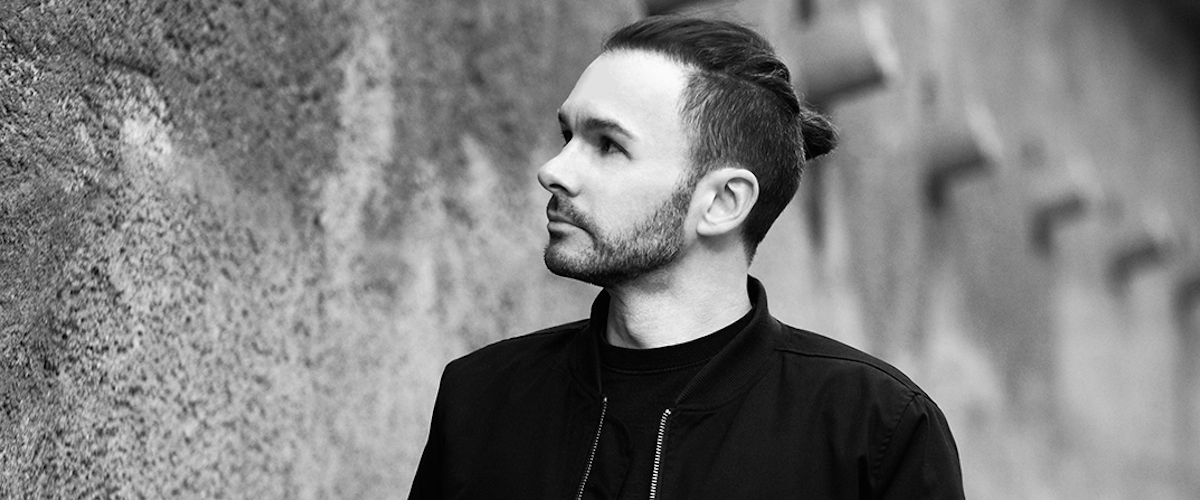
In the Studio: Milton Bradley
Marking his upcoming LP, the Berlin-based artist discusses gear, records, labels, and his main sources of inspiration.

Having been born and raised in Berlin, it’s clear that Milton Bradley’s dark and moody studio output is influenced by the city’s gloomy landscape. Over the past eight years, Bradley has become something of a stalwart in the Berlin techno scene, with all but a few of his releases coming through his own Do Not Resist the Beat! imprint. The versatility in his work is worthy of particular note, evidenced through his side projects, namely Alien Rain and End To All Existence. While the former shows his penchant for acid house/techno—the genre that first pulled him into the world of electronic music in the late ’80s—the latter moniker is used to sketch apocalyptic sonic visions using ambient and drone vocabulary. With Tragedy Of Truth, the latest Milton Bradley LP scheduled for late April release, now seemed like the perfect moment to visit him in his Berlin apartment to discuss gear, records, labels, and his main sources of inspiration.
How did you start making music and DJing?
I discovered this music in the late eighties. I read something about acid house which was very big at that time, and it sounded very interesting to me. I wanted to know more about it, and so I got a mixtape (I don’t remember where from). After the Berlin wall came down, I got more mixtapes and discovered all this Belgium techno like R&S, Music Man etc. It really got me. It felt like that it was exactly the music I had always been waiting for. Then I went to the first clubs, met some people who were also interested in this kind of music, went to record stores—because I wanted to have the records on the mixtapes—and it slowly grew from there.
When did you start playing records?
It’s actually quite a funny story. I had some records at home that I had never heard in a club, so I brought these records to a club and said to the DJ, “Could you play this?” At the time, I wasn’t aware that this was a no-go because the whole DJ and mixing thing was completely new to me! Of course, he didn’t play it—so I thought to myself, “Why don’t you just play it yourself?” That was the reason why I started DJing, but it was low profile and just for fun. I did some parties with friends and played mostly Berlin, and some other cities in Germany. At the end of the ‘90s, with all the uptempo and very percussive loopy stuff, the music turned into something I didn’t really like. I quit DJing t0 focus myself more on other things. Then, around 2005/2006, when my girlfriend and I broke up, I was pretty sad and I started listening to techno again to see what was new on the market—to see what was happening regarding the techno scene. This was the time when that Marcel Dettmann, Ben Klock, Sleeparchive stuff came up. It sounded fresh and interesting to me, and I started buying records again and digging deeper into all that.
“I’ve never been a crazy hardware collector; I spent most of my money on records.”
Did you begin producing around this time?
Yes. The break up left me with all these feelings, and I tried to express myself with music. Around that time, in 2007, a friend who had been making music for some time introduced me to some new software he was using, which I then instantly bought. I already had bought some machines in the late ‘90s—like a 303, a Boss drum machine, a Quasimidi Sirius and so on. Back then I was never really satisfied because I could only do very limited stuff with them. I’ve never been a crazy hardware collector; I spent most of my money on records. But with all the new software, I had the opportunity to do much more. I played around with it and, “influenced” by some of the happenings in my life shortly before, I could now express myself with music. A couple of tracks were finished quickly, and I decided to release some of the tracks, just for fun. So me and a friend put our money together and we made a record. The first one came out in January 2009, and it was surprisingly sold out in less than two weeks. This was the starting shot to continue making music and a way to constantly express myself.
What techniques did you use for that first record?
The first record was made with some recorded sounds from a friend and the few machines I had, processed with Reason, Pro Tools and some other software tools. That’s what I usually do: I record sounds and I process the sounds using software—Ableton, Protools, Record and a few more.
Is this still your way of working?
Yes. I’m always looking for new ways to treat sounds and new ways to combine things. I always look for new software and see if it can do something new because I don’t want to repeat myself every record. That’s why I am constantly looking for new software!
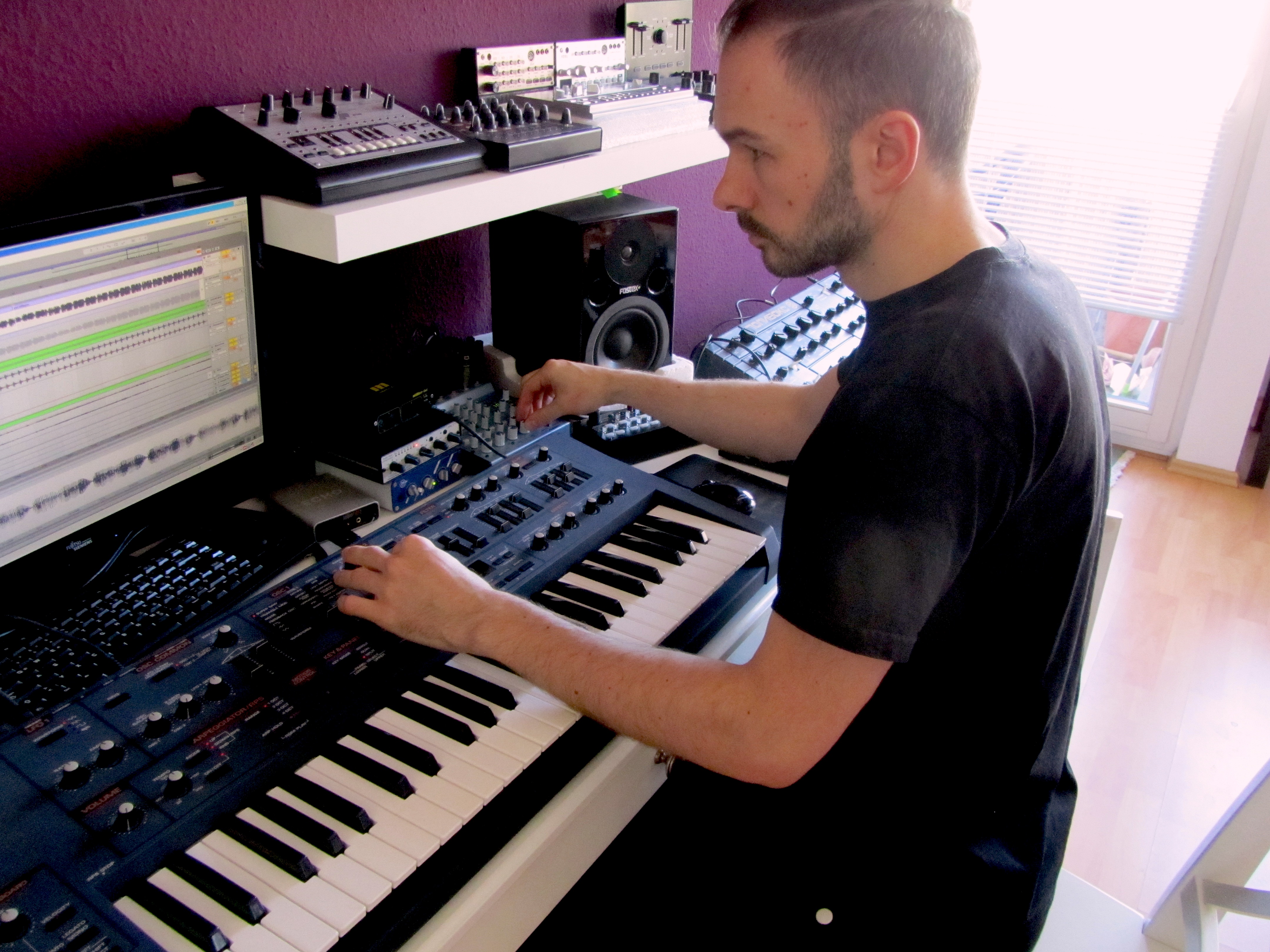
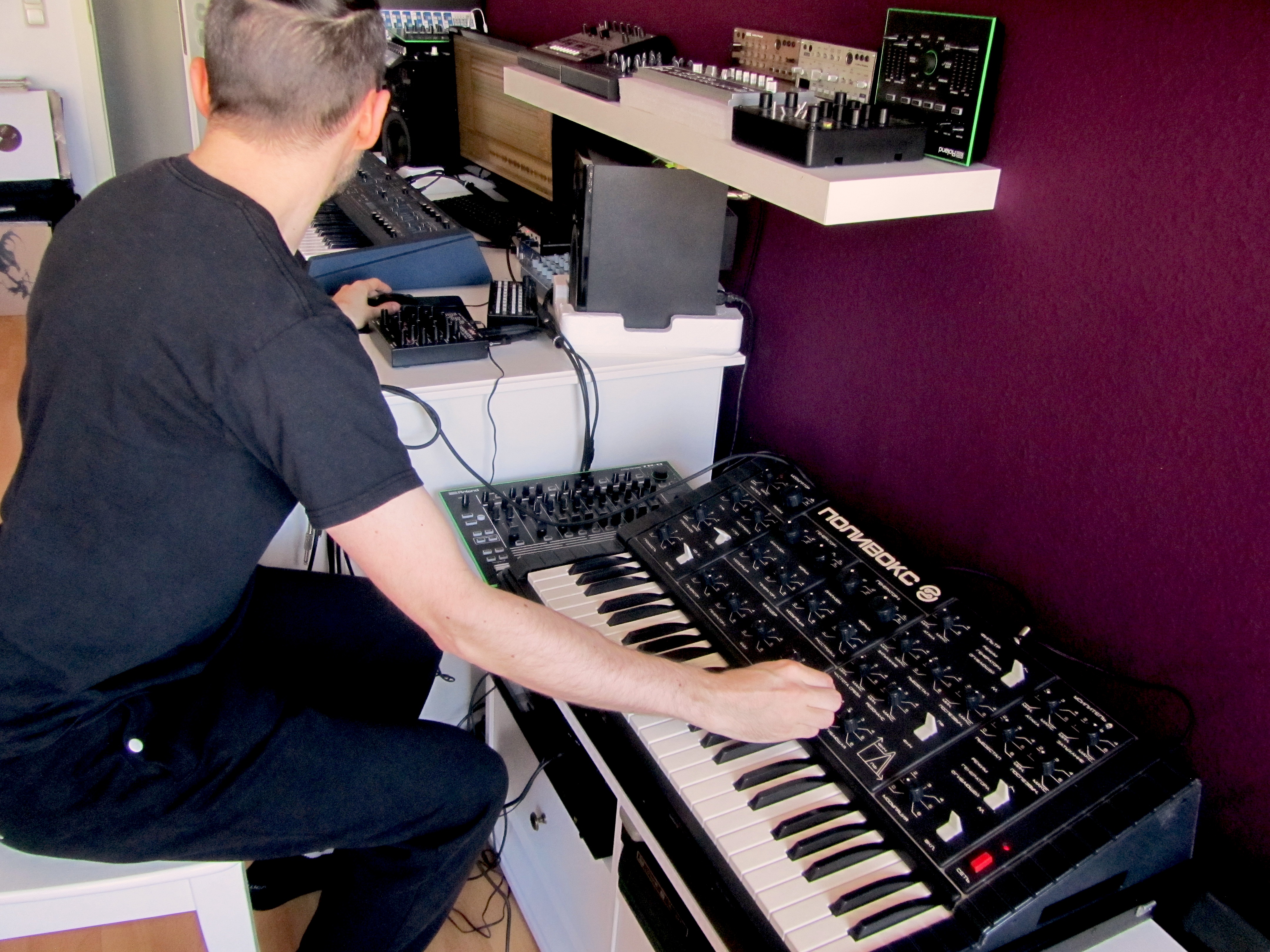
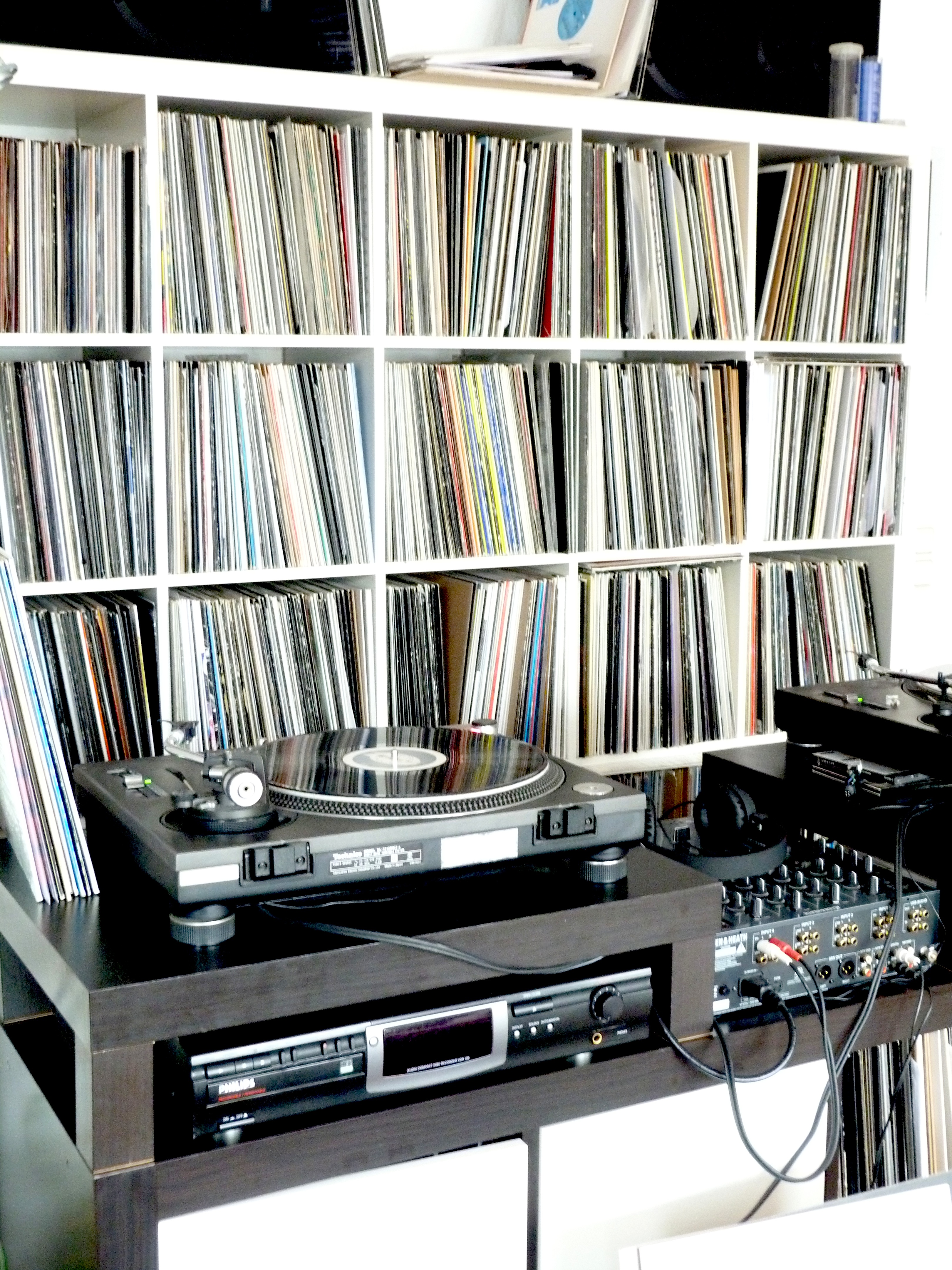
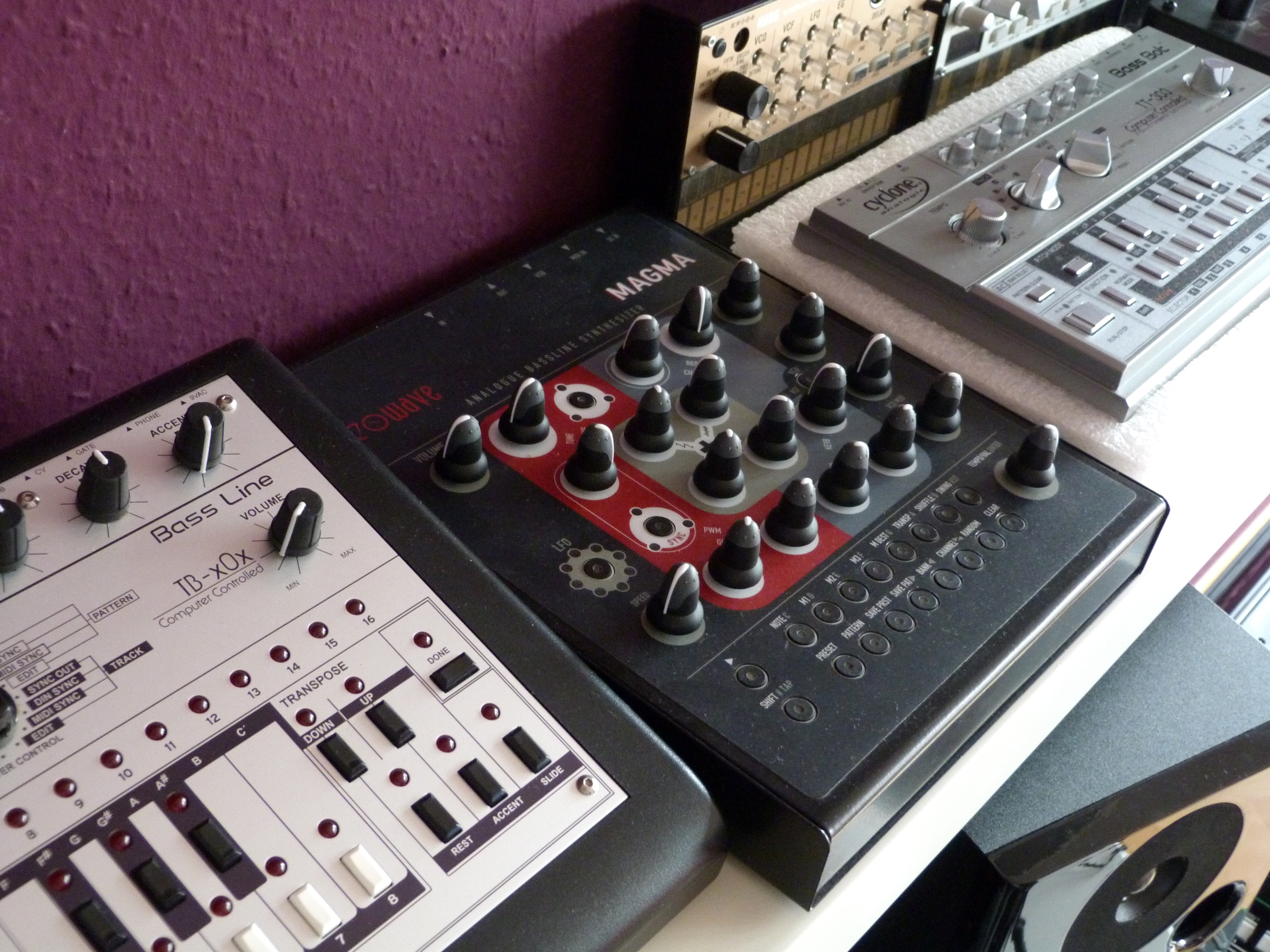
Is there a certain way you start a track?
It depends. Sometimes it starts with a certain mood I have or an idea/concept of the things that I want to do. When I have this idea, I will try to realize it—but most of the time I just turn the machine on and record what I do, and I get inspired by that. I have a certain mood when I make music, and I try to find the sounds that best represent or reflect the mood that I have. When I am in a sad and darker mood, I find that I am into deeper, spacey sounds that can make you fly away or whatever. I record these sounds and then I put all the other sounds together. So when I actually record the sound, it’s like a jam session—but I actually record the sound, and the rest of the track is already in my head. In the end I then put it all together like a surgeon. I also sit here often doing MIDI-notes to send to the machines or I try to combine effects that can treat the sound in a unique way. I am constantly looking for new ways to treat the sounds, to manipulate the sounds and to do things differently.
You said you are in a certain mood when you make music. Is that connected to a certain hour of the day?
No, it’s not connected to a certain hour of the day; it’s more connected to a mood or a feeling that I have. Situations or feelings—whatever I have, I am trying to express myself. It’s comparable to a singer-songwriter: They also try to release feelings or ideas into songs. Every record has a story behind it, so I try to put all my feelings into the sound and express something. With the Alien Rain project it’s a bit different—it’s just for fun. I want to do acid music I like, but with the other music I want to face feelings and experiences I had.
Considering your music is rather dark, and your music directly reflects your mood, are you in a dark place when working on it?
Well, I am here in my room, and I wouldn’t say it’s a particularly dark place! But maybe my mind is the dark place then [laughs]. For example, The End Of All Existence project. This is a fictional thing I am referring to—for example, movies in which the world is ending and stuff like that. Like a soundtrack for these kind of movies. But when I started making this music, I was in a darker mood and this really fit at that time. So I would say it’s a combination of these two things.
You got back to doing music after having a rough period in your life. Did it help to make music?
Lots of artists want to express something with art. That’s why people make art. It was a good way to process the whole thing and combine that with my love for the music. Yes, I would say it helped and it still does in the way I process similar situations.
Would you consider yourself to be a DJ or a producer, firstly?
I am both. I DJ and I produce music—but actually I always wanted to be a DJ. I have always wanted to play records, and to present this music to an audience. I started as a DJ but I couldn’t do just one thing anymore because I always have lots of ideas in my mind and there is always something to create.
You mentioned you are always looking for new ways of treating sound. Is there one machine that really defines the Milton Bradley sound?
It is always changing. I think the use of some software effects is more what defines my sound—but when it comes to machines, I often use the X0x0x for the acid tracks. I used to have the Quasimidi Sirius that I was using for spacey sounds, but I replaced that with the JP-8000. Currently I am a really big fan of the Polyvox synthesizer. It has a great raw sound and I love how it looks, and the haptic sensation of it. Besides that, I use the Roland Aira TR-8 for drums as well as the TB-3 and the Bassbot as an alternative to the X0xb0x. I also use some plug-in synths. When it comes to effects, I mostly use software effects because I can record all the filter moves and can easily combine different parts of them. I have more control over the parameters which is very important to me because it has to be perfect. I am often looking for new freeware plug-ins because you can sometimes find really crazy effects besides all the popular plug-ins that everyone knows.
Is there some effect units that you have grown accustomed to, that you use regularly?
Not really, it’s always changing.
What are you using at the moment?
When it comes to software: Ableton and a lot of different VST plug-ins, and Reason which has nice onboard effect modules that I used a lot in my first productions. It has these the Combinator modules in which you can combine different effects. For example a Pattern Control Filter, which I couldn’t find in other music software. I used it for the third fourth Alien Rain release. I really like using the digital sampler of it where you can put sliced samples in and play the slices randomly. Most of the tracks from my first records were created with this.
Is this how you create the drone sounds with a more complex texture that seem ever-present in your music?
Yes, often. There is this recycle tool where you load a sample and you can decide on the point where the sample gets sliced. Then I put the sliced sample into the sampler, and I play the different slices in different octaves or different directions so that you can create totally weird and complex sounds. This is an example of me trying to treat the sound in a way that probably not everybody is doing.
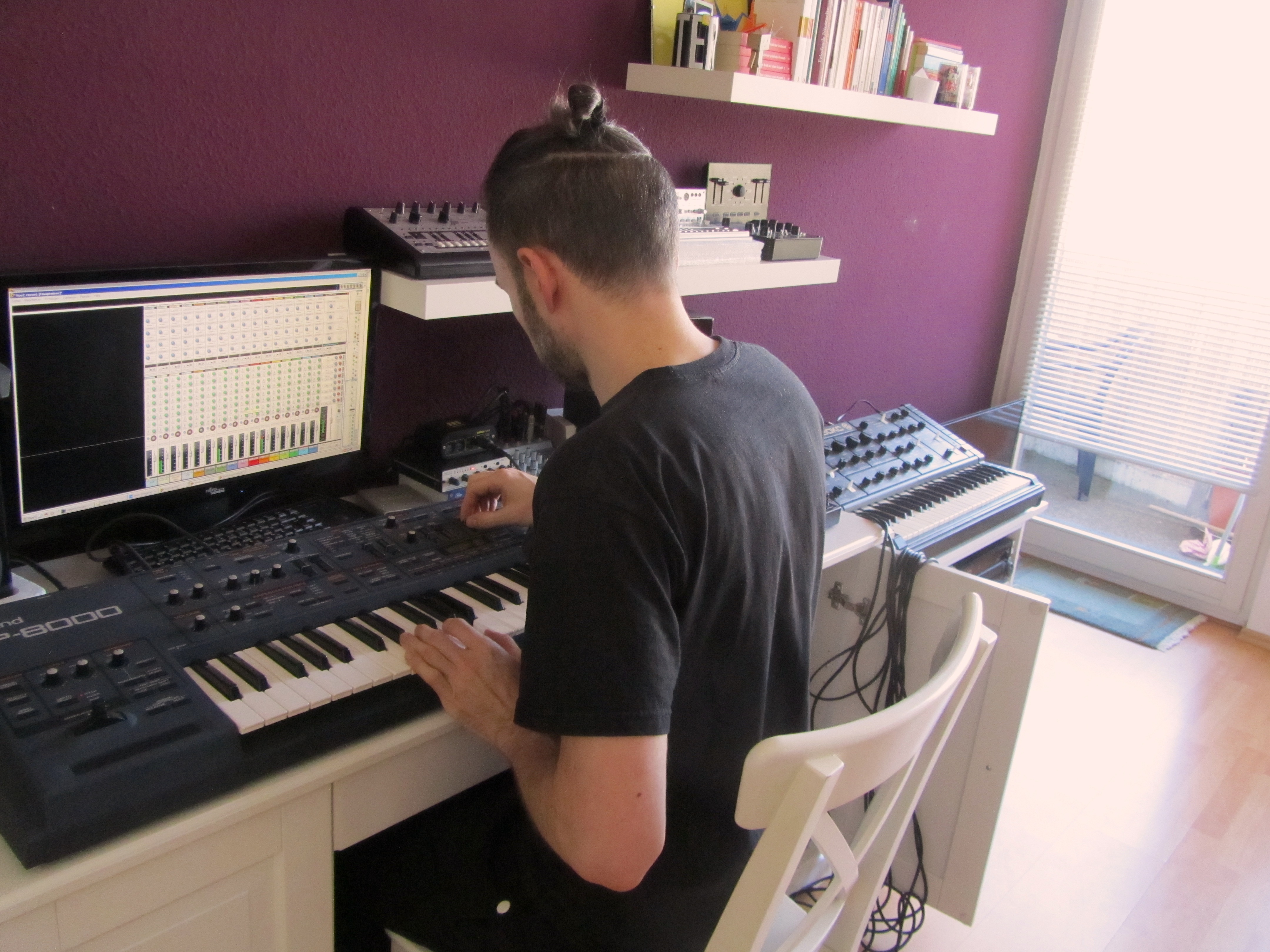
You played live with Alien Rain for a while. What did your setup look like?
The setup was actually quiet basic. It was a combination of the Xoxbox, a Roland TB-303 clone, and a laptop with Ableton. Most of the other sounds, like percussion and pads, were pre-recorded samples. I would play pre-recorded parts from my computer—this way I would combine different drum patterns on the fly with live synths. But it’s not really possible to present this music in a full “live” setup because of all the filter movements I use on the acid lines that are not possible to control – I only have two hands. That’s why I did it this way.
You only played Alien Rain live for one year. Why?
I played live in 2014 because many people asked me to do it and I thought it was a good way to present the project to an audience. But I don’t want to play this kind of music to death and have it seem that I am only doing acid music. The acid thing is quite specific in style and I don’t want people to get tired of it. That’s why I decided to only do it for a year.
What does a studio day look like? Do you work from nine-to-five, or do you just create whenever you are inspired?
I wouldn’t call it a studio day. I just make music when I am in the mood. Sometimes I am working on music for just a few hours, sometimes a few days. Sometimes I just sit here on the couch and think, “What if I combine these and that?” then I move over to my table, turn on my computer and see how it works. I then often sit there for hours, just recording sounds. If I have a new machine, I connect it to my computer and I record sounds for one or two days. I sometimes sit here just writing MIDI-notes which I can send to the machines later. Or I try to combine effects that can treat the sound in a unique way. When I am working on an idea I often inspire myself—the thing I am doing inspires me for a new idea. When I make an interesting sound, I will immediately make a track out of it. And while making a track, I will usually have an idea for another track so I normally end up with 10 or 15 tracks per day. I save the first track and move on to the next one. It can be a bit chaotic, but I handle the chaos.
“There is no structure to what I am doing. It’s totally chaotic.”
So, in a short period of time, you create a lot of ideas that are probably still pretty raw, and then you go back to them later?
Exactly. Sometimes I sit here and listen to tracks I made some months or even years ago and think, “This is cool,” that it would fit with the concept of my next record. There is no structure to what I am doing. It’s totally chaotic.
To what the degree are the tracks developed in your initial session? Is it just a collection of loops or do you already have a basic arrangement?
It depends. Most of the tracks are almost finished and just need some modifications or need to be re-arranged, or I add a few things. Sometimes I also finish a whole record in one day. I remember once my friend was visiting me. We were having a coffee and I said, “Let me check how this effect works with this,” and I sat down and I made all the three tracks for the fourth Alien Rain EP that afternoon. That’s also possible!
And then they are totally finished? Ready for mastering?
They are nearly finished. Of course, I listen to them twice and then I take them to a friend’s studio with the single audio tracks to do a proper mix-down. He is a mastering engineer and has a good monitoring system, so I make a proper pre-master and then send it off to mastering.
Is it a conscious decision to have your studio at home, instead of having an external space?
It is the most convenient way for me. My studio and my records have always been a part of my living room. I never had the records in a separate room. I want to have those things close to me—it has been a part of my life for years. I really want to have it at home, so without leaving the house I can mix or I can produce.
Do you have any problems separating your private life and your music—or is this one thing?
There is actually no need for separating it. It’s not really a job to me – its an important part of my life. I am so connected to this that I cannot divide it like that, and I don’t want to.
You are primarily releasing on your own label. Is it a conscious decision to not release on other labels?
Yes. When I release on my own label, I can do what I want, when I want, and in the way that I want. I never had the intention to send out demos. I did two releases on Prologue records. After I did a remix for Cio D ‘Or on that label, they asked me about tracks for a possible release and fortunately they liked all the tracks that I sent to them. They also gave me the freedom to do it the way that I wanted it. I could decide which track I wanted on which side, what the artwork would be, and who would master it. But that’s rarely possible if you release on other labels.
So you seem to have specific ideas about the concept of the release and you want to have control over this. Do you have people that you send music to for their opinion before you release?
I have one or two friends whose opinion I respect. Sometimes I send them some material to ask for their opinion. But if I really like a certain track and they dislike it, I will still use it.

